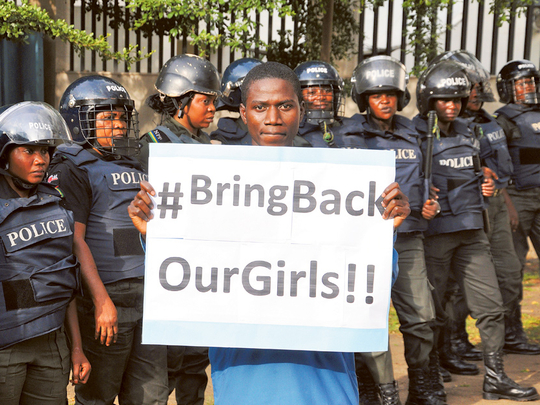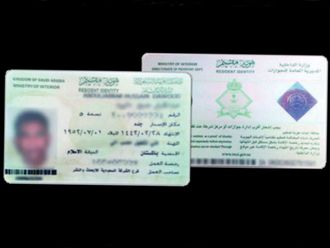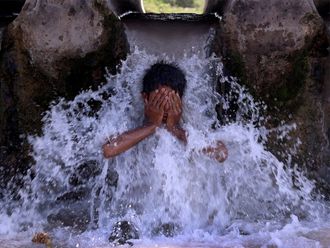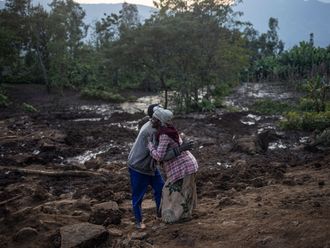
Lagos: Parents of more than 200 Nigerian schoolgirls abducted by Islamist militants six months ago are angry at the lack of progress obtaining their release after Cameroon’s success in securing the freedom of 27 hostages.
Some of the parents of students from the town of Chibok have decided to say final prayers for their offspring since the April 14 kidnapping by Boko Haram, said Enoch Mark, who lost a 20-year-old and an 18-year-old to the militants.
The hostages in Cameroon were handed over to the authorities and taken to the capital, Yaounde, Minister of Communication Issa Tchiroma said on October 11, without giving further details about the release. Among the hostages was the wife of Deputy Premier Amadou Ali, who was captured in July in the northern part of the country, and ten Chinese nationals who were kidnapped near the northern town of Waza in May.
“The Cameroonian government worked hard to ensure that the wife of the deputy prime minister and others were released,” Mark, 60, said on Monday by phone from the capital, Abuja. “Why is Nigeria’s government not so serious about our issue? Are they playing games with us?”
Boko Haram has been fighting security forces in Nigeria for the past five years, bidding to impose Islamic law in Africa’s biggest economy and oil producer. In that time it has killed more than 13,000 people, Nigerian President Goodluck Jonathan said last month. Boko Haram has increased raids in Cameroon this year, and the nation’s President Paul Biya promised on Monday to eradicate the group.
‘Damaged confidence’
“The release of the hostages in Cameroon places greater pressure on the Nigerian authorities to secure the release of the Chibok schoolgirls,” said Sarah Tzinieris, principal Africa analyst at Bath, UK-based risk consultancy Maplecroft. The abduction “has seriously damaged public confidence in the Goodluck Jonathan government.”
The public should show patience because the schoolgirls will be freed and the Nigerian government is winning the battle against Boko Haram, government spokesman Mike Omeri said on October 9 by phone.
Jonathan said on Monday that leaders from neighbouring Benin, Cameroon, Chad and Niger will finalise the deployment of troops to form a multinational force on November 1 to fight Boko Haram.
“Precedent suggests that the Nigerian government is well aware that Boko Haram is willing to negotiate but is itself not keen on pursuing this option,” Ryan Cummings, the Cape Town-based chief Africa analyst at security company Red24 Plc, said by e-mail on Tuesday.
The Chibok girls’ kidnapping sparked international outrage and pledges of support to find them by countries including the US and the UK Nobel Peace Prize winning Pakistani activist Malala Yousafzai visited Nigeria in July to emphasise their plight.
In Washington, Susan Rice, President Barack Obama’s national security adviser, said on Tuesday the US will continue assisting Nigeria in the search with advice, intelligence and personnel.
The US State and Defence Departments are putting $40 million (Dh146 million) into a security contingency fund to help Cameroon, Chad, Niger and Nigeria counter Boko Haram, by providing training, equipment and technical expertise, according to a White House fact sheet.
The US is also starting two programmes valued at as much as $150 million to help meet educational needs for girls and boys in northern Nigeria.
The longer the girls remain missing the less likely that they’ll be returned together either through negotiations or by military force, said Francois Conradie, a political analyst at NKC Independent Economists.
“I really doubt they’re all in the same group after six months, some of them will have been given away as brides to the fighters,” Conradie said in a phone interview from Cape Town.
In Cameroon, a ransom may have been paid for the 27 hostages, Conradie said.
“It’s a different situation from girls just from random low-middle class families in the north of Nigeria,” Conradie said. “Their families aren’t going to be able to put a ransom together and the government won’t.”
For Chibok parent Mark, hope of his daughters’ return is fading.
“In our culture, if someone was missing in a bush for three months we say prayers,” Mark said. “Because we believe they may have died.”










_resources1_16a30b3523c_small.jpg)

